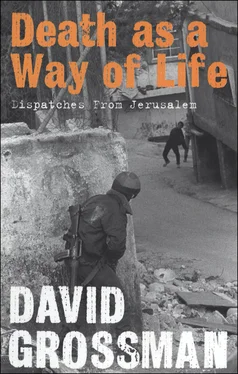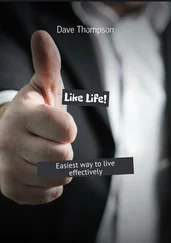David Grossman - Death as a Way of Life
Здесь есть возможность читать онлайн «David Grossman - Death as a Way of Life» весь текст электронной книги совершенно бесплатно (целиком полную версию без сокращений). В некоторых случаях можно слушать аудио, скачать через торрент в формате fb2 и присутствует краткое содержание. Год выпуска: 2013, Издательство: Bloomsbury Publishing, Жанр: Прочая документальная литература, на английском языке. Описание произведения, (предисловие) а так же отзывы посетителей доступны на портале библиотеки ЛибКат.
- Название:Death as a Way of Life
- Автор:
- Издательство:Bloomsbury Publishing
- Жанр:
- Год:2013
- ISBN:нет данных
- Рейтинг книги:5 / 5. Голосов: 1
-
Избранное:Добавить в избранное
- Отзывы:
-
Ваша оценка:
- 100
- 1
- 2
- 3
- 4
- 5
Death as a Way of Life: краткое содержание, описание и аннотация
Предлагаем к чтению аннотацию, описание, краткое содержание или предисловие (зависит от того, что написал сам автор книги «Death as a Way of Life»). Если вы не нашли необходимую информацию о книге — напишите в комментариях, мы постараемся отыскать её.
Death as a Way of Life — читать онлайн бесплатно полную книгу (весь текст) целиком
Ниже представлен текст книги, разбитый по страницам. Система сохранения места последней прочитанной страницы, позволяет с удобством читать онлайн бесплатно книгу «Death as a Way of Life», без необходимости каждый раз заново искать на чём Вы остановились. Поставьте закладку, и сможете в любой момент перейти на страницу, на которой закончили чтение.
Интервал:
Закладка:
I don’t know how it is with you, but here close friends, and even relatives, who always believed in peace, and hoped that most of the Palestinians were undergoing a similar process, now feel truly brokenhearted and betrayed. What was the point of offering Arafat so much, of compromising even on Jerusalem, when he encourages such violence, when there is no certainty that he can control his people, and when the schools and mosques of the Palestinian Authority continue to teach and preach the destruction of Israel?
And beyond that, Israelis say today — you can hear it everywhere — even if we give the Palestinians everything, all the territories, and evacuate the settlements and even hand over all of East Jerusalem — the following day they’ll want the rest of Jerusalem and Haifa and Jaffa. They’ll always find a new pretext for violence, for nurturing their hatred and their yearning to throw us into the sea. I have my own answers to those questions, nowadays somewhat more hesitant. I still believe there’s truth in these answers, but I feel how weak this reasoning is, in light of the fire and the fury of hatred.
*
Suddenly, in an impulse of despair, out of isolation, and in protest of the situation that prevents me from doing something so simple and natural, I call you.
You recognize my voice at once, and I hear your relief. We speak for a long time. Your family is unharmed, but the little boy next door was killed. I tell you that bullets were fired tonight on the Jerusalem neighborhood where my brother lives. We both still observe a kind of symmetry, a balance in our reporting, which of course balances nothing, nor does it comfort; despite it all, we are still representatives. You sound agitated and beyond hope — I have never heard you sound this way. It is a nightmare, you say, never has the situation been as awful, and there is no way of knowing how it will end. You blame Israel. The way it dragged out the negotiations for years, far beyond what was agreed on at Oslo. You speak of the impossibility of reaching peace without evacuating the settlements. About how Israel humiliated the Palestinians in the negotiations, and then went so far as to demand that they consider intra-Israeli political problems, while completely ignoring Arafat’s shaky position. Israel tried to impose peace on him under conditions that no Palestinian, even the most moderate, would accept.
I agree with you that the way Israel conducted the peace process was faulty, aggressive, hostage to profound Israeli fears, and unable to empathize with the Palestinian point of view. For years I’ve thought that the peace agreement itself, as it was engineered in Oslo, was the product of brusque Israeli dictation, and that the reality it was meant to create was not going to ensure neighborly relations. Despite that, I say, look at the change that has taken place in Israel with regard to peace since the Oslo process began, especially in the past year, under Barak’s administration. Can you deny the man’s courage, his willingness — which astounded and incensed many Israelis — to hand over most of the occupied territories to you, and to give up parts of Jerusalem, the innermost heart of the Jewish people? Don’t you know, as I do, that a generation’s worth of years will pass before there is another Israeli leader who is both so courageous and able to retain the confidence of the Israeli people in his defense policy? And if you miss this opportunity, you’ll find yourselves facing Sharon (and we, too, I think to myself, we too will find ourselves in that dangerous position).
You are familiar with my arguments and respond to them with your arguments, which are familiar to me. It is as if both of us have to quote them repeatedly, are trapped within them, and feel that our positions never completely comprehend the whole dilemma. There’s always that humiliating sensation that we — the Israeli and the Palestinian — are nothing but a pair of actors sentenced to acting on stage, generation after generation, a grotesque and bloody tragedy whose denouement no one can write, a scene that would offer a hope of relief, of the lifting of the curse.
What frightens me, you say, is that the debate now is not only between governments, or between our armies and police, but between the peoples, the civilians. And the worst is that after Sharon’s visit to the Temple Mount, it has once more become a feral, tribal, and religious battle.
It seems to me that the situation deteriorated not with Sharon’s visit to the Temple Mount, which was, in and of itself, provocative and malicious, but rather when Arafat announced three months ago at Camp David that he could not sign a compromise agreement on Jerusalem. He represents, he said then, not only 5 million Palestinians but also the world’s billion Muslims. At that moment, to my mind, the possibility of a solution eluded us, and it turned into a religious conflict. You and I know that religious fanaticism, whether Jewish or Muslim, is your and my real enemy. Neither you nor I can live our lives as we desire under an extremist religious regime. In the end, the relevant borders for most Israelis and Palestinians are not only those between the two peoples, for all their importance, but those between the moderates and extremists on both sides. That should be one of our major motives for reaching a compromise, at almost any price, in order to weaken the religious forces that are growing so strong now.
But we cannot accept the solutions you are offering us, you say — there can be no peace with the settlements, there can be no peace when what we finally get, after such a long struggle, is a tiny state without control of our water sources and most of our territory, a state crosscut by hundreds of Israeli roads and roadblocks. There can be no peace when every time I open my blinds in the morning I see the settlement on the mountaintop that looms over me. Do you know that the settlers call me every night and demand that I leave my city? They, who only twenty years ago settled here by force.
It won’t be a just peace, I admit, but I hope that as a first step it will be a good-enough peace. We can’t hope for more than that in the meantime, but maybe afterward, many years from now, when animosity has diminished, when a normal fabric of life has been established, perhaps even trust renewed …
I want you to know, you say out of context, how sad and shocked I was by the lynching of the Israeli soldiers. It is horrifying. I blame the Palestinian police, because no matter how the Israelis got there, from the minute unarmed people are under your protection, you must safeguard them. No, such an atrocity simply must not be allowed to happen. Even in such a brutal struggle we must retain our humanity.
I ask if there are others who think as you do, and you say that the great majority of Palestinians were appalled by the incident. I have trouble believing you. The sight of the faces of the murderers and their cries of carnage are still so vivid in my memory. The hands proudly raised aloft, soaked in the blood of the murdered men. I then recall a conversation we had not long ago in a Jerusalem café, before the world turned over on all of us. There we concurred that the Oslo agreement had been possible because the two leaders, Rabin and Arafat, had finally realized, after years of holding to a militant, aggressive worldview, that the conflict was seeping into the innermost tissues of their peoples, infecting them with violence and brutality, and decomposing them from within.
And you remind me that we said one more thing on that day. We had no illusions about this — we knew that this peace process would be a very bitter one. That it would be full of successive acts of enmity and violence, on both sides, acts that time after time would move Israelis and Palestinians to cry out in rage, each in turn, Look how impossible it is to believe them! Look what a mistake we made when we made sacrifices to them! We’ll never, never live in peace side by side!
Читать дальшеИнтервал:
Закладка:
Похожие книги на «Death as a Way of Life»
Представляем Вашему вниманию похожие книги на «Death as a Way of Life» списком для выбора. Мы отобрали схожую по названию и смыслу литературу в надежде предоставить читателям больше вариантов отыскать новые, интересные, ещё непрочитанные произведения.
Обсуждение, отзывы о книге «Death as a Way of Life» и просто собственные мнения читателей. Оставьте ваши комментарии, напишите, что Вы думаете о произведении, его смысле или главных героях. Укажите что конкретно понравилось, а что нет, и почему Вы так считаете.












